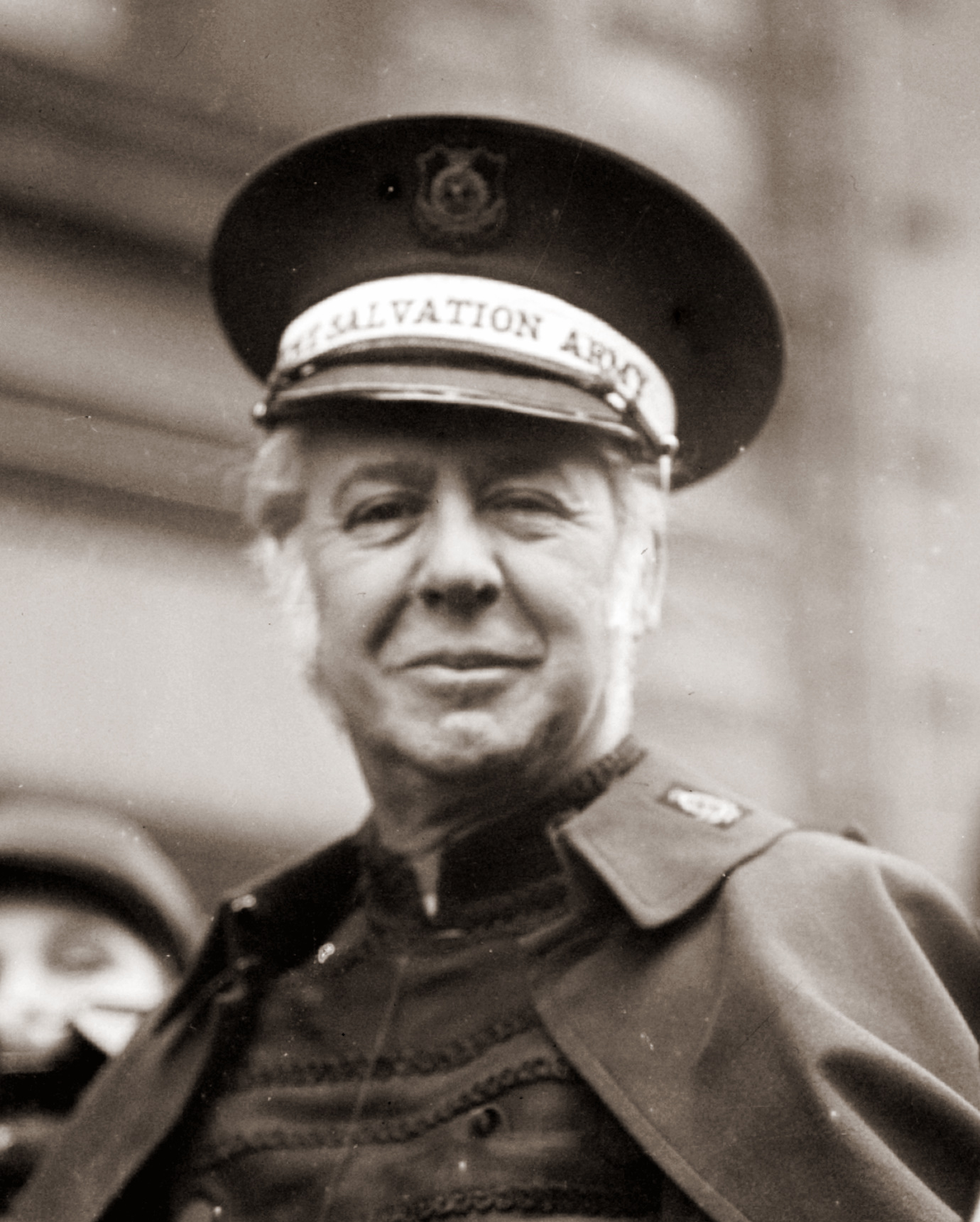|
William Booth
William Booth (10 April 182920 August 1912) was an English Methodist preacher who, along with his wife, Catherine, founded the Salvation Army and became its first "General" (1878–1912). His 1890 book In Darkest England and The Way Out outlining The Salvation Army social campaign became a best-seller. The fundamentalist Christian evangelical movement, with a quasi-military structure and government as founded in 1865, then spread from London, England, to many parts of the world and is known today as one of the largest distributors of humanitarian aid. Early life William Booth was born in Sneinton, Nottingham, the second son of five children born to Samuel Booth and his second wife, Mary Moss. Booth's father was relatively wealthy by the standards of the time, but during William's childhood, the family descended into poverty. In 1842, Samuel Booth, who could no longer afford his son's school fees, apprenticed the 13-year-old William Booth to a pawnbroker. Samuel Booth died on 2 ... [...More Info...] [...Related Items...] OR: [Wikipedia] [Google] [Baidu] |
Sneinton
Sneinton (pronounced "Snenton") is a suburb of Nottingham, England. The area is bounded by Nottingham city centre to the west, Bakersfield to the north, Colwick to the east, and the River Trent to the south. Sneinton lies within the unitary authority of Nottingham City, having been part of the borough of Nottingham since 1877. Sneinton existed as a village since at least 1086, but remained relatively unchanged until the industrial era, when the population dramatically expanded. Further social change in the post-war period left Sneinton with a multicultural character. Sneinton residents of note include William Booth, founder of The Salvation Army, and mathematician George Green, who worked Green's Mill at the top of Belvoir Hill. In modern times, regeneration has seen most of the old telephone exchange converted into student accommodation, the market place replaced by a pedestrian plaza and the wholesale fruit and fish market units in the traditional avenue layout re-used f ... [...More Info...] [...Related Items...] OR: [Wikipedia] [Google] [Baidu] |
General Of The Salvation Army
General is the title of the international leader and Chief Executive Officer (CEO) of the Salvation Army, a Christian denomination with extensive charitable social services that gives quasi-military rank to its ministers (who are therefore known as officers). The General is elected by the High Council of The Salvation Army and serves a term of five years, which may be extended to seven years. Brian Peddle, the current general, assumed the position in August 2018 upon the retirement of Andre Cox. The organisation's founder, William Booth, was the first and longest-serving general. There have been 21 generals as of 2018. History and procedures for election Usage of the term "general" began with the founder of The Salvation Army, William Booth. His wife, Catherine Booth, the organisation's co-founder, became known as the "Mother" of The Salvation Army. General Booth served as general until his death in 1912; Booth selected his son, Bramwell Booth as his successor. It was William ... [...More Info...] [...Related Items...] OR: [Wikipedia] [Google] [Baidu] |
Methodist
Methodism, also called the Methodist movement, is a group of historically related denominations of Protestant Christianity whose origins, doctrine and practice derive from the life and teachings of John Wesley. George Whitefield and John's brother Charles Wesley were also significant early leaders in the movement. They were named ''Methodists'' for "the methodical way in which they carried out their Christian faith". Methodism originated as a revival movement within the 18th-century Church of England and became a separate denomination after Wesley's death. The movement spread throughout the British Empire, the United States, and beyond because of vigorous missionary work, today claiming approximately 80 million adherents worldwide. Wesleyan theology, which is upheld by the Methodist churches, focuses on sanctification and the transforming effect of faith on the character of a Christian. Distinguishing doctrines include the new birth, assurance, imparted righteousness ... [...More Info...] [...Related Items...] OR: [Wikipedia] [Google] [Baidu] |
Kennington Park
Kennington Park is a public park in Kennington, south London and lies between Kennington Park Road and St. Agnes Place. It was opened in 1854 on the site of what had been Kennington Common, where the Chartists gathered for their biggest "monster rally" on 10 April 1848. Soon after this demonstration the common was enclosed and, sponsored by the royal family, made into a public park. Kennington Common was a site of public executions until 1800 as well as being an area for public speaking. Some of the most illustrious orators to speak here were Methodist founders George Whitefield and John Wesley who is reputed to have attracted a crowd of 30,000. The common was one of the earliest London cricket venues and is known to have been used for top-class matches in 1724. G. B. Buckley, ''Fresh Light on 18th Century Cricket'', Cotterell, 1935. Kennington Park hosts the first inner London community cricket ground, sponsored by Surrey County Cricket Club whose home, The Oval, is close to ... [...More Info...] [...Related Items...] OR: [Wikipedia] [Google] [Baidu] |
Evangelism
In Christianity, evangelism (or witnessing) is the act of preaching the gospel with the intention of sharing the message and teachings of Jesus Christ. Christians who specialize in evangelism are often known as evangelists, whether they are in their home communities or living as missionaries in the field, although some Christian traditions refer to such people as ''missionaries'' in either case. Some Christian traditions consider evangelists to be in a leadership position; they may be found preaching to large meetings or in governance roles. In addition, Christian groups who encourage evangelism are sometimes known as evangelistic or ''evangelist''. Etymology The word ''evangelist'' comes from the Koine Greek word (transliterated as ''euangelion'') via Latinised ''evangelium'' as used in the canonical titles of the Four Gospels, authored by (or attributed to) Matthew, Mark, Luke, and John (also known as the Four Evangelists). The Greek word originally meant a reward given ... [...More Info...] [...Related Items...] OR: [Wikipedia] [Google] [Baidu] |
Tuberculosis
Tuberculosis (TB) is an infectious disease usually caused by '' Mycobacterium tuberculosis'' (MTB) bacteria. Tuberculosis generally affects the lungs, but it can also affect other parts of the body. Most infections show no symptoms, in which case it is known as latent tuberculosis. Around 10% of latent infections progress to active disease which, if left untreated, kill about half of those affected. Typical symptoms of active TB are chronic cough with blood-containing mucus, fever, night sweats, and weight loss. It was historically referred to as consumption due to the weight loss associated with the disease. Infection of other organs can cause a wide range of symptoms. Tuberculosis is spread from one person to the next through the air when people who have active TB in their lungs cough, spit, speak, or sneeze. People with Latent TB do not spread the disease. Active infection occurs more often in people with HIV/AIDS and in those who smoke. Diagnosis of active TB is ... [...More Info...] [...Related Items...] OR: [Wikipedia] [Google] [Baidu] |
Evangelism
In Christianity, evangelism (or witnessing) is the act of preaching the gospel with the intention of sharing the message and teachings of Jesus Christ. Christians who specialize in evangelism are often known as evangelists, whether they are in their home communities or living as missionaries in the field, although some Christian traditions refer to such people as ''missionaries'' in either case. Some Christian traditions consider evangelists to be in a leadership position; they may be found preaching to large meetings or in governance roles. In addition, Christian groups who encourage evangelism are sometimes known as evangelistic or ''evangelist''. Etymology The word ''evangelist'' comes from the Koine Greek word (transliterated as ''euangelion'') via Latinised ''evangelium'' as used in the canonical titles of the Four Gospels, authored by (or attributed to) Matthew, Mark, Luke, and John (also known as the Four Evangelists). The Greek word originally meant a reward given ... [...More Info...] [...Related Items...] OR: [Wikipedia] [Google] [Baidu] |
Preacher
A preacher is a person who delivers sermons or homilies on religious topics to an assembly of people. Less common are preachers who preach on the street, or those whose message is not necessarily religious, but who preach components such as a moral or social worldview or philosophy. History Preachers are common throughout most cultures. They can take the form of a Christian minister on a Sunday morning, or an Islamic Imam. A Muslim preacher in general is referred to as a '' dā‘ī'', while one giving sermons on a Friday afternoon is called a ''khatib''. The sermon or homily has been an important part of Christian services since Early Christianity, and remains prominent in both Roman Catholicism and Protestantism. Lay preachers sometimes figure in these traditions of worship, for example the Methodist local preachers, but in general preaching has usually been a function of the clergy. The Dominican Order is officially known as the ''Order of Preachers'' (''Ordo Praedicatorum ... [...More Info...] [...Related Items...] OR: [Wikipedia] [Google] [Baidu] |
Religious Conversion
Religious conversion is the adoption of a set of beliefs identified with one particular religious denomination to the exclusion of others. Thus "religious conversion" would describe the abandoning of adherence to one denomination and affiliating with another. This might be from one to another denomination within the same religion, for example, from Baptist to Catholic Christianity or from Sunni Islam to Shi’a Islam. In some cases, religious conversion "marks a transformation of religious identity and is symbolized by special rituals". People convert to a different religion for various reasons, including active conversion by free choice due to a change in beliefs, secondary conversion, deathbed conversion, conversion for convenience, marital conversion, and forced conversion. Proselytism is the act of attempting to convert by persuasion another individual from a different religion or belief system. Apostate is a term used by members of a religion or denomination to refer to so ... [...More Info...] [...Related Items...] OR: [Wikipedia] [Google] [Baidu] |
Nottingham, England
Nottingham ( , locally ) is a city and unitary authority area in Nottinghamshire, East Midlands, England. It is located north-west of London, south-east of Sheffield and north-east of Birmingham. Nottingham has links to the legend of Robin Hood and to the lace-making, bicycle and tobacco industries. The city is also the county town of Nottinghamshire and the settlement was granted its city charter in 1897, as part of Queen Victoria's Diamond Jubilee celebrations. Nottingham is a tourist destination; in 2018, the city received the second-highest number of overnight visitors in the Midlands and the highest number in the East Midlands. In 2020, Nottingham had an estimated population of 330,000. The wider conurbation, which includes many of the city's suburbs, has a population of 768,638. It is the largest urban area in the East Midlands and the second-largest in the Midlands. Its Functional Urban Area, the largest in the East Midlands, has a population of 919,484. The populatio ... [...More Info...] [...Related Items...] OR: [Wikipedia] [Google] [Baidu] |
Evangelical
Evangelicalism (), also called evangelical Christianity or evangelical Protestantism, is a worldwide Interdenominationalism, interdenominational movement within Protestantism, Protestant Christianity that affirms the centrality of being "born again", in which an individual experiences personal conversion; the authority of the Bible as God in Christianity, God's revelation to humanity (biblical inerrancy); and evangelism, spreading the Christian message. The word ''evangelical'' comes from the Greek (''euangelion'') word for "the gospel, good news". Its origins are usually traced to 1738, with various theological streams contributing to its foundation, including Pietism and Radical Pietism, Puritanism, Quakerism, Presbyterianism and Moravian Church, Moravianism (in particular its bishop Nicolaus Zinzendorf and his community at Herrnhut).Brian Stiller, ''Evangelicals Around the World: A Global Handbook for the 21st Century'', Thomas Nelson, USA, 2015, pp. 28, 90. Preeminently, ... [...More Info...] [...Related Items...] OR: [Wikipedia] [Google] [Baidu] |



.jpg)



.jpg)
.jpg)

.jpg)